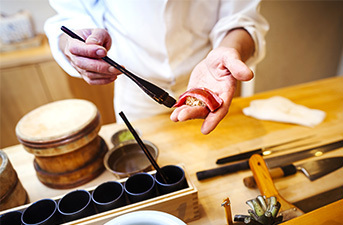Japan Sushi Restaurants(411)
Sushi Akazu Nagoya
A sushi lover’s childhood dream, finally come to fruition. The restaurant’s secret to success is in the name: akazu, 10-year aged red vinegar mixed into fluffy shari rice, then topped with the freshest fish.
G -WA Selection- (Tokyo Marriott Hotel)
Billed as authentic Japanese cuisine with a French twist, the Tokyo Marriott Hotel’s G ~WA Selection~ feels just as sophisticated as its name thanks to its stylish treatment of Japanese classics in a luxurious space.
Imayoshi Kojimachi
Located in the business district of Kojimachi, just west of the Imperial Palace, this Imayoshi outlet provides a sushi experience that employs a traditional approach with signature touches.
Sushidokoro Keiji
Get the ultimate sushi experience in one of Sapporo’s most exclusive restaurants. Enjoy expertly-crafted sushi paired with perfectly-chilled drinks in an ultra-private atmosphere, perfect for group dinners and date nights.
Chakaiseki Zushi
Inspired by both daily and ceremonial meals of old, the chef of this chakaiseki restaurant manifests pre-Edo period dining philosophies to serve his guests a traditional culinary experience steeped in tea and tradition.
Hamaichi
These sea bream specialists serve tai-meshi with dedication and finesse. Each meal at Hamaichi underscores Japanese tradition and commitment to service through simple but expertly prepared ingredients.
Sushi Kakuno
Sushi powered by the spring water from the Sakurajima volcanic belt — in Roppongi, Chef Kakuno Masayuki gets the greatest satisfaction when his guests smile.
Sushi Tomo
Enjoy Chef Tomonaga Toshiharu’s signature sushi with natural salt from Nagasaki’s Goto Islands and a generous squeeze of citrus juice, made with the finest Fukuoka seafood purchased fresh every morning.
Ikebukuro Sushi Fukuju
One of Ginza’s most famous sushi restaurants opens a branch in Ikebukuro, bringing the same reputation for quality with it. Experience Edomae sushi with a Michelin star pedigree.
Sushi Nanoumi
Serious sushi and uni lovers cannot miss a pilgrimage to Sushi Nanoumi, where you can enjoy tasting different types of premium Japanese sea urchin and traditional Edomae sushi.
Kagurazaka Sushi Kimoto
Michelin incognito. This Kagurazaka sushi restaurant is actually an offshoot of the famed Shiorian Yamashiro, holder of a Michelin star for three years, and every bit worthy of the original’s stellar reputation.
Kagurazaka Yokota
Vaunted tempura restaurant Yokota comes to Kagurazaka, offering the same excellent tempura that earned it a Michelin star, alongside traditional Edomae sushi made with fresh seasonal ingredients.
Meieki Sushi Sublime
Michelin-starred teppanyaki restaurant Sublime’s only Edomae sushi-centric branch in Nagoya applies the same innovative Scandinavian and French approaches to this storied culinary form, surprising diners with new dimensions of flavor.
Sushi Matsumoto Yokohama
Michelin-starred Sushi Matsumoto arrives in Yokohama with the same consistently high standard for Edomae sushi.
Sushi Shiorian Yamashiro Shinjuku Higashiguchi
It might have adopted a moodier ambiance than its esteemed counterpart, but the Sushi Shiorian Yamashiro branch in Shinjuku stays true to its roots in bringing the quintessence of Edomae sushi to the metropolis.
Shinagawa Sushi Matsumoto
Tucked in Tokyo’s busy transportation hub, Shinagawa Sushi Matsumoto delivers omakase courses with the same caliber that had won its Akasaka branch a Michelin star two years in a row.
Sushi Shiorian Yamashiro Namba
Sushi Shiorian Yamashiro hails from its Tokyo home to the high-paced Namba in Osaka, where the sushi chef isn’t afraid to bring international touches to Edomae sushi.
Hakata Sushi Yokota
Sushi Yokota expands to the port town of Hakata to share its freshly handcrafted tempura dishes and Edomae sushi with the same precision and care as its Michelin-starred main store in Tokyo.
Hakata Sushi Takayama
Few culinary pairings capture harmony as beautifully as kaiseki cuisine and Edomae sushi, a blend mastered at Hakata Sushi Takayama.
Hakata Sushi Momonoki
The sister branch of Michelin-starred Akasaka Momonoki serves traditional sushi with subtle hints of Chinese influences in Japan’s ramen capital.
Hakata Sushi Matsumoto
Building on the legacy of its former Michelin-starred main branch Sushi Matsumoto Akasaka, this sushi joint stands out with its use of seasonal ingredients and the exceptional Edomae sushi.
Akasaka Sushi Matsumoto
The original, formerly Michelin-starred branch of this famed sushi restaurant continues to serve excellent Edomae sushi and traditional small plates in elaborate course menus at its Akasaka location.
Shinjuku Sushi Fukuju
The Shinjuku branch of one of Ginza’s most famous sushi restaurants continues the original’s legacy of excellence. Hon-maguro bluefin tuna from four different regions and top-quality sea urchin solidify its commitment to quality.
Yaesu Sushi Umi
With two Michelin stars for 10 consecutive years. Sushi Umi continues the legacy of greatness with its Yaesu outlet, serving high-class Edomae sushi in omakase course menus directly outside Tokyo Station.
Umeda Sushi Miyagawa
Fine Edomae sushi in Osaka’s downtown district of Umeda. Sushi Miyagawa makes a journey to the west from its home in Shinjuku, to the delight of Kansai sushi lovers.
Shinjuku Sushi Yokota
The famed Michelin-starred restaurant makes its way from Azabu-juban to Shinjuku, bringing with it the same excellent tempura that gave the original its Michelin star in the first place — plus finely crafted Edomae sushi.
Sushi Misuji Caretta Shiodome
Originally founded in 1855, Misuji has achieved new heights with its Edomae-style sushi. Quite literally, as guests enjoy sushi and wine from 46 stories up.
Nihonbashi Funazushi
At this Nihonbashi restaurant, a third-generation owner plays with classic sushi flavors and brings a touch of old Edo to modern Tokyo.


How to reserve sushi restaurants in Japan?
Is a reservation required for sushi restaurants in Japan?
What is the average cost of a meal at sushi restaurants in Japan?
Sushi Restaurants in Japan
A quintessential Japanese food, the beloved Japanese sushi can be found in so many forms at different types of sushi restaurants in Japan. From rolled maki sushi to luxurious kaisendon sushi bowls to individual plates at conveyor belt sushi restaurants, sushi restaurants in Japan are as diverse as the sushi types they serve.
Different regions of Japan may even have their own local specialty style of sushi, depending on what is available in each region throughout the different seasons. Hokkaido is known for its high-quality seafood—like fresh crab and scallops—and sushi by extension. Kyoto is famous for “sabazushi” (a lightly vinegared mackerel sushi). Sushi restaurants in Tokyo carry the proud tradition of “Edomae” sushi, a type of sushi that originated in Tokyo and was considered to be a type of fast food, sold to on-the-go customers by street food stands.
Sushi restaurants in Japan range broadly from local family-run restaurants fitted out with tatami mats to higher-tech operations where you can seamlessly order your next sushi roll with the simple touch of a tablet. You can enjoy an elegant omakase sushi meal at a sushi restaurant in Osaka where a sushi chef prepares each and every piece right in front of your eyes, delicately shaping the rice by hand. Sushi restaurants in Kyoto at local markets serve up fresh sushi and friendly service. You can enjoy casual conveyor belt sushi for just over 100 yen per plate, or splash out several thousand yen at Michelin-starred restaurants in Tokyo.
No matter how you want to enjoy sushi in Japan, there are endless options for sushi restaurants in Japan to suit your budget. You can have a modern fast food sushi experience or a traditional sushi dining experience. Not sure where to start when it comes to sushi in Japan? Reserve a table or counter seat at a sushi restaurant to ensure you get the highest quality Japanese sushi experience.